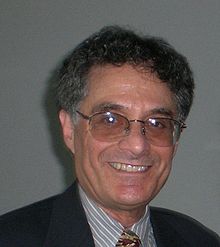- Marc Okrand
-
 Marc Okrand after a talk in Leipzig
Marc Okrand after a talk in Leipzig
Marc Okrand (
 /ˈmɑrk ˈoʊkrænd/; born 1948) is an American linguist and is most notable as the creator of the Klingon language, which he speaks.
/ˈmɑrk ˈoʊkrænd/; born 1948) is an American linguist and is most notable as the creator of the Klingon language, which he speaks.Biography
Okrand worked with Native American languages. He earned a bachelor's degree from the University of California, Santa Cruz in 1972. His 1977 doctoral dissertation from the University of California, Berkeley, was on the grammar of Mutsun, a dialect of Ohlone (a.k.a. Southern Costanoan), which is an extinct Utian language formerly spoken in the north central Californian coastal areas from Northern Costanoan down to 30 miles south of Salinas (his dissertation was supervised by pioneering linguist Mary Haas). He taught linguistics at the University of California, Santa Barbara before taking a post doctoral fellowship at the Smithsonian in Washington, D.C., in 1978.[1]
Okrand took a job at the National Captioning Institute, where he worked on the first closed-captioning system for hearing impaired television viewers. While coordinating closed captioning for the Oscars award show in 1982, Dr. Okrand met the producer for the movie Star Trek II: The Wrath of Khan.[1] He was hired by Paramount Pictures to develop the Klingon language and coach the actors using it in Star Trek III: The Search for Spock, Star Trek V: The Final Frontier, Star Trek VI: The Undiscovered Country and Star Trek: The Next Generation. His first work was dubbing in Vulcan language dialogue for Star Trek II: The Wrath of Khan, since the actors had already been filmed talking in English. He has since consulted for the 2009 Star Trek film in their use of the Romulan and Vulcan languages.[2]
Okrand is the author of two books about Klingon – The Klingon Dictionary (first published 1985) and Klingon for the Galactic Traveler (1997). He has also co-authored the libretto of an opera in the Klingon language: 'u', debuting at The Hague in September 2010. The tlh sound that he incorporated into Klingon, unusual to speakers of North American English, is common in other English accents, and in North and Central American indigenous languages, in which it is usually transcribed as tl, tł or ƛ (a voiceless alveolar affricate with lateral release); this is the sound at the end of the word "Nahuatl". He speaks Klingon, but notes that others have attained greater fluency.[3]
Okrand taught undergraduate linguistics courses at the University of California, Santa Barbara, from 1975 to 1978.
More recently, Okrand created the Atlantean language for the Disney film Atlantis: The Lost Empire.
Okrand currently serves as one of the directors for Live Captioning at the National Captioning Institute and as President of the board of directors of the Washington Shakespeare Company in Arlington, Virginia. The WSC planned to stage "an evening of Shakespeare in Klingon" in 2010.[4][5]
References
- ^ a b Wall Street Journal Helping the Hearing Impaired And Voicing the Klingons, May 14, 2009
- ^ YouTube Okrand Answers "What was your involvement in the new Star Trek movie"
- ^ Rogers, Tony (Monday 7 March 2011). "Ghom tlhIngan Hol lujatlhbogh ghotpu’: Translation: People who speak Klingon meet". Arbiter Online:Boise State's Independent Student Media. http://arbiteronline.com/2011/03/07/linguists-in-hollywood-brings-pizazz-to-boise-state/.
- ^ Washington Post: How the Washington Shakespeare Company came to offer Shakespeare in Klingon
- ^ WSC press release
External links
- Marc Okrand on creating Klingon
- a press release about Marc Okrand at the National Captioning Institute's website
- Marc Okrand at the Internet Movie Database
- Marc Okrand at startrek.com
- Interview with Marc Okrand in the Wall Street Journal
Categories:- 1948 births
- Living people
- American linguists
- Inventors of writing systems
- Language creators
- University of California, Santa Cruz alumni
- University of California, Berkeley alumni
- Linguists associated with Klingon
Wikimedia Foundation. 2010.
